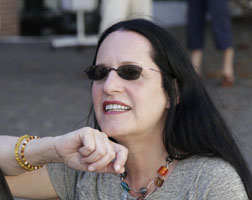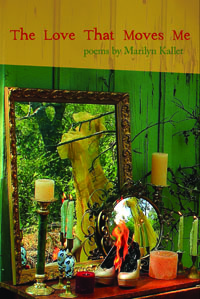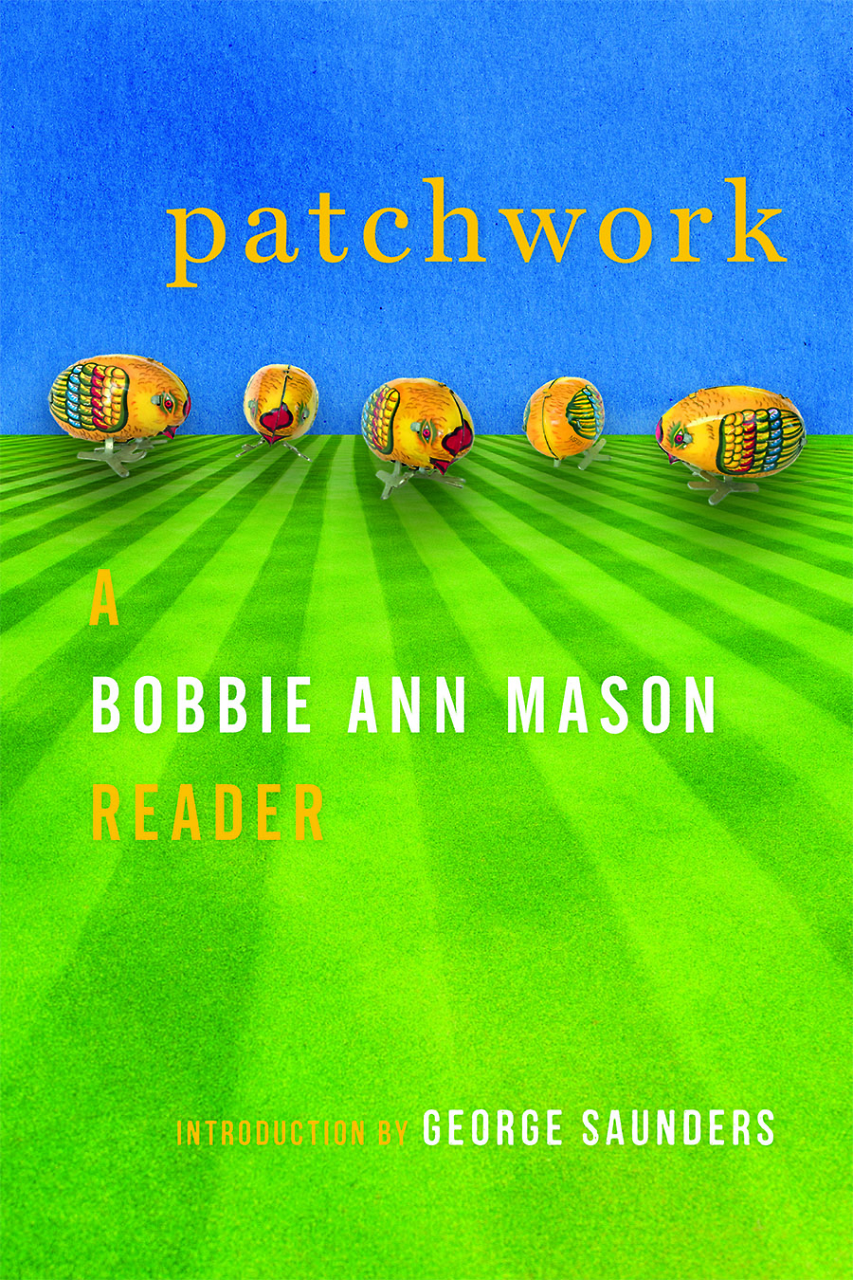Hymns to Passion
Marilyn Kallet’s new poems explore the lighter and darker sides of love
Marilyn Kallet’s new collection of wry, mostly romantic poems, The Love That Moves Me, takes its title from a line in Dante: “Amor mi mosse, che mi fa parlare” (“The love that moved me makes me speak”). Dante is a featured character, along with his beloved Beatrice and a gaggle of other iconic figures, from Orpheus to the Hawaiian goddess Pele. Love is indeed the chief topic here, but Kallet is concerned with more than sexual love. Her focus includes filial love, friendship, and love of humankind.
 “I want you here so badly / I can taste your salt,” she writes in the opening poem, “I Want You Here,” and that frank sexiness sets the tone for much of The Love That Moves Me, although the lust is often lightened with humor. In many of the poems, Kallet channels her take on modern desire and heartbreak through her personal pantheon of love deities, some real (like poet Charles Baudelaire, whom she calls “my boyfriend”) and some mythical. “Treachery” is one of several poems in which Dante and Beatrice confront twenty-first-century romantic angst:
“I want you here so badly / I can taste your salt,” she writes in the opening poem, “I Want You Here,” and that frank sexiness sets the tone for much of The Love That Moves Me, although the lust is often lightened with humor. In many of the poems, Kallet channels her take on modern desire and heartbreak through her personal pantheon of love deities, some real (like poet Charles Baudelaire, whom she calls “my boyfriend”) and some mythical. “Treachery” is one of several poems in which Dante and Beatrice confront twenty-first-century romantic angst:
One day Dante veered toward alien strands.
Curtains! cursed the stars.
Bea tripped over her crystal ball.
She didn’t wish him well in his new new life.
La vita nuova was good enough for her,
why wasn’t it his gelato?
In “D&B, Bickering,” a youthful Beatrice is regarded with resigned envy by a would-be rival: “You can’t look at her and not think God / that was the plan, mates / make your peace with beauty.”
Kallet, who directs the creative-writing program at the University of Tennessee in Knoxville, also teaches for the Virginia Center for the Creative Arts in Auvillar, France. That city serves as the setting for many of the poems, while others are set in Hawaii. Pele, goddess of fire and volcanoes, appears repeatedly in the Hawaii poems as the spirit of powerful femininity, “dreaming of Women’s Time.”
Sometimes Kallet jettisons the icons and becomes a kind of free-verse Dorothy Parker, as in “Exclusive,” a wry look at (in)fidelity:
I loved no one but you.
Well, almost no one.
Forgive me.
I was practicing.
 The Love That Moves Me is not all whimsy and romance. There is serious stuff here, particularly in the poems that deal with the complicated love between parents and children. A family legacy of fear crops up repeatedly. In “Lines I Can’t Cross,” the fear of walking into a lava tube in Hawaii hauls up memories of “my father, stalled / at the mouth of the Lincoln Tunnel / sweating and praying” and of “Grandma Anna” in her Coney Island apartment, “dreading Cossacks.” “Dog Days” says it more bluntly: “You would have had to be dead / not to smell the fear / that soaked my working-class childhood.”
The Love That Moves Me is not all whimsy and romance. There is serious stuff here, particularly in the poems that deal with the complicated love between parents and children. A family legacy of fear crops up repeatedly. In “Lines I Can’t Cross,” the fear of walking into a lava tube in Hawaii hauls up memories of “my father, stalled / at the mouth of the Lincoln Tunnel / sweating and praying” and of “Grandma Anna” in her Coney Island apartment, “dreading Cossacks.” “Dog Days” says it more bluntly: “You would have had to be dead / not to smell the fear / that soaked my working-class childhood.”
These currents of fear all seem to lead back to the collective trauma of anti-Semitism. Several of the poems set in France—“Leaving the House, Auvillar,” “Get This Right,” “Few Talk”—deal specifically with the Holocaust, but offhand references to hatred of Jews crop up elsewhere, as in “The Charm,” a poem about two boy-crazy young girls: “What we wanted—thought we did—were older hoods with / cars. Lucky for us, / they despised Jews.”
Kallet wanders also beyond the romantic realm with poems about 9/11 (“Yom Kippur Remembrance”) and a series of poems about Charles Darwin. The Darwin poems are some of the most moving in the collection; especially “My Dear Emma,” about the death of Darwin’s daughter Anne, and “Eating the New Species,” which places Darwin inside the framework of human ignorance, injustice, and predation.
Along with his instruments, Darwin
packed a Bible, a pistol, and a “peacemaker” club for dis-
putes, like some who would later deny him in Tennessee.
In the hands of a different poet, pairing such serious material with the romantic poems could be awkward, even offensive. But it’s clear that Kallet’s perspective regards all the passions, both grim and joyful, as inseparable—as different faces of our fundamental humanity. There’s no judgment, preaching, or existential despair to be found in these poems; there’s only a celebration of feeling.
Kallet is known for her exuberant performance of her poetry, and almost all of the poems in The Love That Moves Me beg to be spoken aloud. Part of the pleasure of this collection lies in how clearly they convey Kallet’s vibrant personality, as well as her worldly-wise sensibility.
In connection with the launch of The Love That Moves Me, Marilyn Kallet will give several readings in Knoxville: on April 10 in the Goins Buidling Auditorium at Pellissippi State Community College, on April 15 at the Hodges Library Auditorium on the University of Tennessee campus, and on April 21 at Union Ave. Books..Kallet will share the PSCC and UT readings with poet Arthur Smith. Click here for event details.


